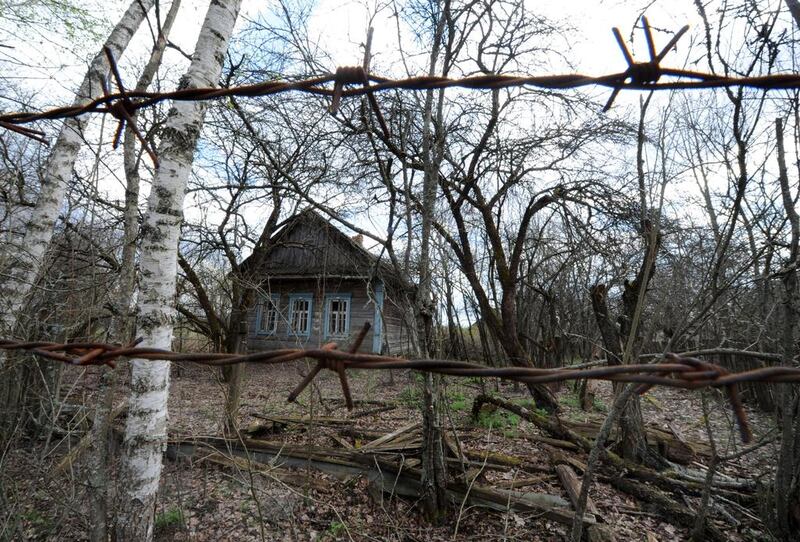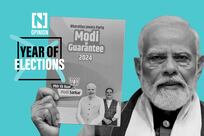Weddings in the Belarusian capital of Minsk are not complete without a visit to the Island of Tears. To safeguard their unions, newlyweds must cross a humpback bridge from the affluent suburb of Traetskaye to a small island in a bend in the Svisloch river. The soil there is foreign, brought home by mothers who travelled to Afghanistan to find their sons, but instead found their sons’ graves. They carried home fragments of the earth that had devoured their children during the long, suicidal occupation of Afghanistan by the Soviet Union. There are 771 names recorded on four altars inside a haunting monument – a temple with bronze sculptures of mourning mothers and widows, clutching portraits of their war dead, set at its base – on one side of the island. This is Belarus’s share of the 14,500 Soviet lives lost between 1979 and 1989, when the Soviets withdrew. Almost three years later, the Soviet Union collapsed.
The idea that they had served in the defence of the Soviet Union ennobled for many veterans the torment of Afghanistan. The couples who now come to the Island of Tears remember the martyrs by way of a prayer to be spared their fate.
A quarter of a century after the war, the veterans of the Afghanistan war – Afghantsi – are surprisingly easy to spot. They wander the streets, in ill-fitting clothes, outside the elite military school that is only a stone’s throw from the war memorial. They get drunk on cheap vodka in the bars of crumbling Soviet-era hotels. A veteran I ran into some years ago in the Frunzenskaya district of Minsk interrupted his evocative rendition of old Hindi film songs at about midnight, and, barely able to stand, clasping my hand and suppressing tears, he kept repeating this line: “I have seen so much horror, brother; you will not believe what I have seen ...”
Svetlana Alexievich, this year's laureate of the Nobel Prize in Literature, would have merited wide recognition if she had written nothing apart from Zinky Boys: Soviet Voices from the Afghanistan War (1992). A collection of short narratives stitched together from the vivid testimonies of surviving veterans, it is, in its unsparing detailing of the horrors perpetrated and endured by the Soviet soldiers in Afghanistan, often so harrowing as to be unreadable. The title derives from the zinc coffins in which bodies of fallen Soviet soldiers were secretively repatriated home. Soviet censorship of the press meant that, for a long time, ordinary citizens knew little about the war that sucked a million young men into service.
The literary strength of Zinky Boys was confirmed by the swift retaliation against its author by the KGB, who brought intense pressure to bear upon on veterans and their families to recant the testimonies they had given her. The subsequent court case against Alexievich, a little known writer at the time, nearly bankrupted her – her research material was seized, and she was accused of slandering the Red Army and barred from writing about Afghanistan.
Two-and-a-half decades later, Zinky Boys remains the most valuable record of the recollections of Soviet soldiers irreparably bruised by their exposure to war. Reading it today, it is impossible not to see in the seemingly interminable US-led war in Afghanistan a repetition of so many Soviet fantasies that turned to ash. Soviet soldiers, like their 21st-century US counterparts, believed they were on a mission to defend, as one soldier phrases it to Alexievich, "our way of life". Yet every gallant act undertaken by the Soviets to draw Afghanistan into the modern world yielded only resentment. And hostility quickly turned, with massive American aid, into fullblown insurgency. Reprisals by the occupying forces were savage.
One soldier tells Alexievich, as she travels through Afghanistan: “We captured some terrorists and interrogated them: ‘Where are your arms dumps?’ No answer. Then we took a couple of them up in helicopters: ‘Where are they? Show us!’ No answer. We threw one of them on the rocks ... They killed my friend. Later I saw some of them laughing and having a good time. Whenever I see a lot of them together, now, I start shooting. I shot up an Afghan wedding. I got the happy couple – the bride and groom. I’m not sorry for them – I’ve lost my friend.”
Barrack life could be as terrifying as the mujahideen lurking in the mountains. The harshness faced by new recruits, in the words of a soldier interviewed by Alexievich, was a matter of “life and death”.
When their tour ended, soldiers were sent home in freshly pressed uniforms that were first dipped in engine oil to restore their dark-green colour. The farewell address, by a “political education officer”, was a list of what could and could not be spoken about the war at home: “No mention to be made of fatalities, nor of any ‘unofficial activities’, because we are a ‘great, powerful and morally healthy’ army. All photographs and films to be destroyed. We did not shoot, bombard, use poisons or lay mines here. We are a great, powerful and morally healthy army.”
At home, their service went unrecognised and the political union in whose name they risked their lives, were maimed and killed, fell apart. Some went mad. Some became hard drinkers. Some sought purpose in violence.
“Afghantsi”, a word once spoken with reverence, acquired negative connotations. “It hurts me to think how gullible I was”, Alexievich records a soldier as telling her. “There was this slogan: ‘Afghanistan makes brothers of us all’. Crap!”
To Alexievich, war and violence are male preoccupations. "I can't rid myself of the feeling that war is a product of male nature", she writes in Zinky Boys. Yet one of Alexievich's great accomplishments as a journalist and historian is to have excavated the suppressed experiences of Soviet women at war. Born in 1948 in Soviet Ukraine to a Belarusian father and a Ukrainian mother, Alexievich moved with her parents to southern Belarus as a child.
After graduating from the journalism school at the Belarus State University in 1972, she took up a teaching job at a boarding school and worked as a reporter. She was casting about for material for a book. Fiction seemed an inadequate vehicle to convey the experiences of the Soviet peoples. The Soviet author and critic Ales Adamovich, the most significant intellectual influence on Alexievich, thought it a “blasphemous” abdication of writerly duty to turn to fiction to make sense of the “nightmares of the 20th century”. By the close of the decade, Alexievich had found her subject: the Soviet women who had served in the Second World War. It was an audacious enterprise: as a Soviet writer, she was breaking from established literary traditions in pursuit of a new form. Alexievich had to locate – without access to government files – female veterans and persuade them to talk to a stranger about their most turbulent memories.
The result was War's Unwomanly Face (1983), which, although initially suppressed by the authorities for propagating "pacifism", went on to sell 2 million copies in the Soviet Union. Its title is a tribute to Adamovich's lament: "War has an unwomanly face. But nothing in that war has engraved itself upon our memory with such impact, sharpness, horror and beauty as the faces of our mothers."
More than 80,000 Soviet women had served in the war. Alexievich’s book goes some distance in rescuing them from Soviet propaganda even as it amplifies their sacrifice. There are few regrets among the women who repelled the Nazis; the reluctance to speak about their actions stems from the difficulty they feel in reconciling their post-war roles as mothers and sisters with their violent conduct during the war. The clamour of patriotic Soviet women to be dispatched to the front was accompanied always by an unspoken feeling that they were undertaking an “unwomanly” task. On the front, their ruthlessness in hunting down Germans was matched only by the tenderness with which they often cared for wounded enemies.
Alexievich's most recent book, Voices From Chernobyl: The Oral History of a Nuclear Disaster (1999), is also her best-known work outside the former Soviet Union. Her mastery of the interview technique is evident from the details revealed by her subjects. And like Zinky Boys, it is not always easy to read. Alexievich supplies the context that turned the explosion at the Chernobyl nuclear power plant in April of 1986 into a catastrophe. The secrecy that governed the containment effort meant that hardly anyone in the very beginning grasped the extent of the danger they were being exposed to: "Over the radio they tell us they might evacuate the city for three to five days, take your warm clothes with you, you'll be living in the forest. In tents. People were even glad – a camping trip! ... People got barbeques ready. They took their guitars with them, their radios."
It took 14 days for the people exposed to radiation to die. There is a devastating testimony of a pregnant wife, Lyusa, newly married and madly in love, who witnessed the degeneration of her firefighter husband’s body in just two weeks. Within hours of being exposed, he was flown out and hidden away in a hospital in Moscow. She found him and, for the remainder of his life, stayed by his side in the “bio chamber” in which he was kept. Doctors warned her that the person she thought of as her husband was now “a radioactive object with a strong density of poisoning”. But she continued to care for him: “The last two days in the hospital – I’d lift his arm, and meanwhile the bone is shaking, just sort of dangling, the body has gone away from it. Pieces of his lungs, of his liver, were coming out of his mouth. He was choking on his internal organs. I’d wrap my hand in a bandage and put it in his mouth, take out all that stuff.”
Given the severity of the trauma suffered by so many of the characters that people Alexievich’s books, it seems almost miraculous that they could bring themselves to talk about their experiences to a stranger with a tape recorder. That they did is a testament to Alexievich’s empathy and skill as a journalist and interviewer.
Alexievich, 67, becomes one of a handful of non-fiction writers to be awarded the Nobel Prize in Literature, an honour that will be officially conferred next month. There has been some grumbling about the decision. (V S Naipaul’s non-fiction alone – covering everything from America to Africa and India and the Middle East – is bulkier than Alexievich’s entire oeuvre, and he received his Nobel at the age of 69, after publishing nearly three dozen books.) There is, not for the first time, a political whiff about the Swedish Academy’s decision.
Critics of Russia have rushed to explain her win as a rebuke to the Russian president, Vladimir Putin. This does a disservice to Alexievich, who, despite a short period of voluntary exile from the Belarusian dictatorship of Aleksandr Lukashenka, is not a political writer in the Soviet dissident tradition. In Zinky Boys, she bemoans the "message, drummed into us for so long, that we are superlative in every way, the finest, the most just, the most honest. And whoever dares express the slightest doubt is guilty of treachery, the one unforgivable sin!" This indictment is no longer true only of the former Soviet Union or Russia.
As the events of the last decade show, it is to some degree true also of those nations to whom Russia has long served as a convenient moral foil. Alexievich’s body of work was forged in the specific context of the lands she inhabited. It would be a folly to believe that its lessons are confined to them.
Kapil Komireddi, an Indian journalist, has written from South Asia, Eastern Europe and the Middle East.





